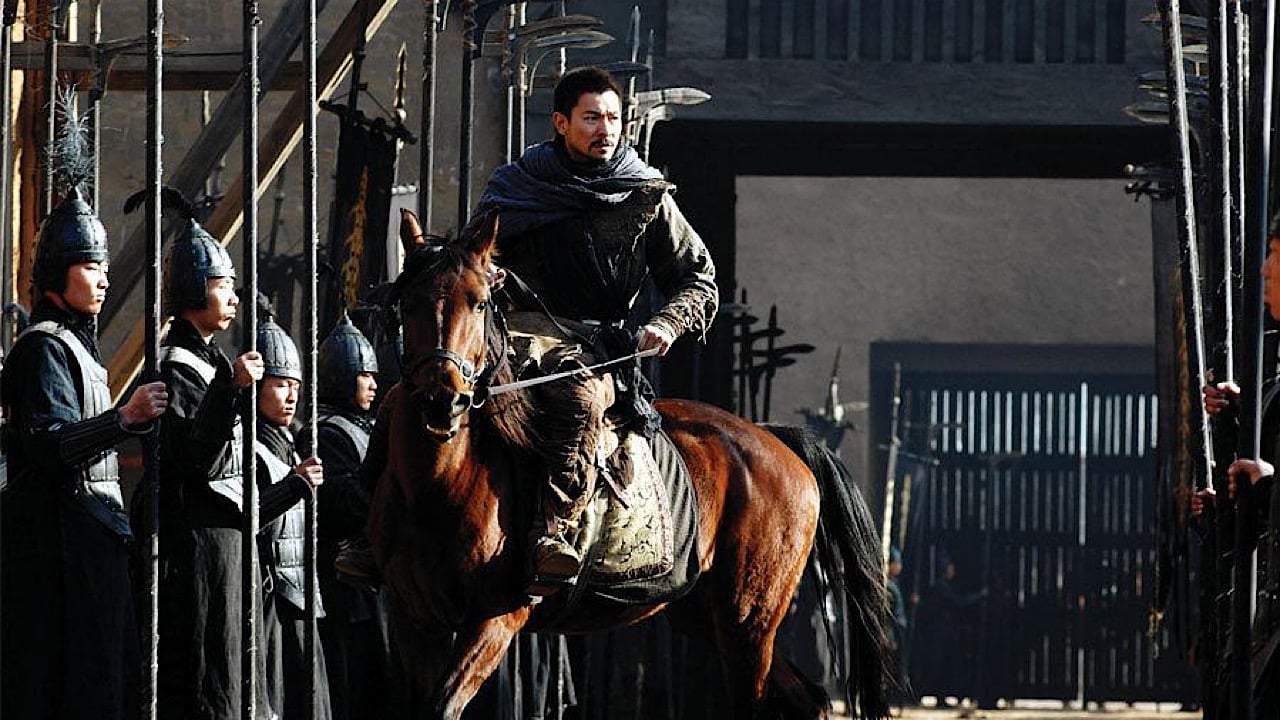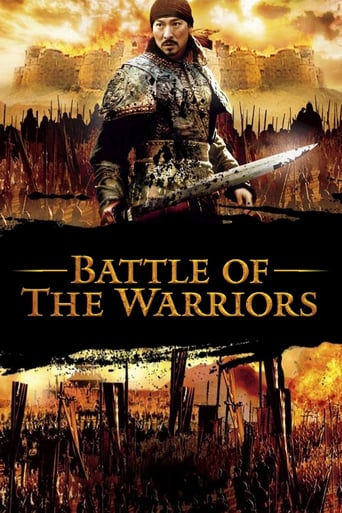

What makes it different from others?
... View MorePurely Joyful Movie!
... View MoreOk... Let's be honest. It cannot be the best movie but is quite enjoyable. The movie has the potential to develop a great plot for future movies
... View MoreThe film's masterful storytelling did its job. The message was clear. No need to overdo.
... View MoreThis film is based on Bokko, one of the finest Japanese manga ever crafted, about one man - Ge Li - sent to defend a besieged city in ancient China. Andy Lau here plays the main character, effectively downplaying his super-stardom with a delicate, subdued and humble performance. Apart from him, we get epic battles with twists, a couple of very nifty strategic ideas, and all the grievances and politics of the besieged city of Liang come to a boiling point. Ge Li has to fight enemies from within and without.Chinese filmmaking often draws upon that nation's very rich literary heritage, and it's often exciting to see the best it has to offer when that heritage blends with great aesthetics backed up by an important budget. "Hero" comes to mind of course, probably as the pinnacle of the genre. But even that film belies a worrying trend in mainstream Chinese film: ideological bullying. Back to this in a second...Technically, the film is of course very competently made, the period and city are created to perfection, even if the visual style is never more than generic. Where things begin to go sour is in the characterizations. The source manga has very rich, complex characters, and while it is unfair to condemn a film under 3 hours for failing to capture the wealth of a 400+ page graphic novel, one wonders why the filmmakers did not cut content for the sake of depth rather than the opposite. A lot happens very quickly, and it is very hard to care for anyone but Lau's Ge Li. This problem is further compounded by the apparently chronic irrationality of many characters: they act in frustrating ways, seemingly just because the film requires them to in order to complicate the hero's predicament.On the previously mentioned ideological front, things become downright risible. The source manga is a tribute to the value of the individual and the vices of the ruling class. On the other hand, the film suggests (word for word in one scene) that only unity will end war in China, and the leader of the invading army is made into a far more compelling human being than any of the inhabitants of the besieged city. In the end, the film is a case study in how filmmaking by committee leads to bland and idiotic results: nonexistent character, crude ideological content, spectacle for its own sake and a total absence of personality.But it has two good things going for it: first, it might get you to read the infinitely superior manga. The second reason is a man named Andy Lau.
... View MoreI expected "a battle of wits" a great movie after seeing its introduction and actor lists. I went to movie theater to watch, but it absolutely made me disappointed.I think director want to descirbe different personality vividly, but there are so many illogical reactions. The unreasonable war is mentioned many times, so I'd to talk about the captain of Zhao, why would he agree to meet Ge Li at the isolated room? Is it the exhibition of brave? NO!! It's totally a stupid decision. A captain is responsible for the safety of armies, how could he put himself a dangerous zone??And the most ridiculous is soldiers lift the captain and run away...does it makes the episode funny?? I think it can just break the serious atmosphere of the battle, and it's really illogical, how dare are the soldiers to offend their captain? Isn't Zhao's army rule really strict?? Too many questions...
... View MoreOne the surface, one could associate BoW with "The Alamo", as an account on the siege of a city. The similarity, however, ends there. While "The Alamo" is about simple, sweet heroism, BoW is more complex.Finally, someone has the guts to invest in a "Chinese historic epic" that is not intended to please the general Hollywood-type audience. And this time, the movie is made by a Hong Kong director (Cheung Chi-leung) one who has never been afraid to take things slowly even if it means that probably a majority of the audience will get "bored". "Ji sor" (1997) is a perfect example.Shot in a grainy, brownish hue, BoW depicts how a wandering strategist (think "Yojimbo") Ge Li (Andy Lau) helps the besieged city defend against overwhelming odds (the complex historical background can probably be ignored without losing much from appreciation of the movie). While a strategist, Ge is first and foremost a philosopher, spreading the gospel of "universal love" and "no violence". The battle scene, though impressive at times, is not the soul of the movie, as the complex character of Ge plays a more important part in attracting the attention of an appreciative audience. Just as intriguing are his nemesis General Xiang (veteran Korean actor Ahn Sung-kee) and wicked-to-the-bone governor of the city (veteran Chinese actor Wang Zhiwen "Half life fate" and "The emperor and the assissin").BoW is not your regular war epic (although it is not lacking in good action sequences) in many of which you'll find one-dimensional characters aplenty. It strives to give its characters depth (just compare the Andy Lau in this movie and the same actor in "House of the flying dagger"). It also tries to give the audience something to reflect on after leaving the cinema. Although it is not without flaws (could be better paced and tends to get preachy at times), this movie is generally successful in what it sets out to do.
... View MoreThe first thing to be gotten "out-of-the-way" when watching "Battle of Wits" is the somewhat dubious production values (camera-work, lighting, editing,etc.), resembling more of a TV-movie than a "Hollywood epic"-- but its story/ material is EXCELLENT! It is essentially an "idea/ issue" movie-- the characterization is one-dimensional and the events just serve as "platforms" for ideas/ issues of Mozi philosophy. And it is this very approach which will annoy some viewers and delight others.Like Crouching Tiger Hidden Dragon-- whose success give investors the confidence to finance "Battle of Wits"-- people are going to have problems the "genre-bending" nature of this movie.... Historical "fantasy" film? Philosophical "war" movie? It attempts various "movie" moments-- e.g. the rather obvious CGI sequence of the first full-on assault which, unlike the beautiful but stupid sequence in Hero, shows a "full" army and what each section of the army is doing. Yet it refuses to dwell on gratuitous or "entertaining" imagery.But thanks to the director, the realistic "mood" set in the movie is enough to make the audience winced even when the gory scenes are NOT shown-- you are taken "into" the warfare where there is a rather disturbingly level of groaning. And the bodies and burials, the defenders are always taking people out of the city for burial.While some may complain about its "flow" or "completeness" because it is based on a 11-volume Japanese manga (which in turn is based on a Japanese novel), all the events in the movie are "explicable" (even historically "inspired")-- although they are not that well "depicted/ edited"... if only they had better special effects directors and action choreographers (& lots more $).True to the sign of the times, "Battle of Wits" is:1) a SNAFU (anti-)war movie. That is "Situation Normal- All F**ked Up"-- or everything which can go wrong will go wrong. The tagline of the movie is "100,000 vs 5,000" I think, so it's not too much of a spoiler to point out that the morale or "spirit" of the defenders is so low that it is always "cracking up". OTOH, the morale or "spirit" of the invaders is so high that they treat it as a game and "crack up" whenever something unexpected happens.2) a "Casualties of War" movie. Those being the times of "maiming" arrows & fire, rather than "instant-kill" bullets and bombs, everyone who is shot, hurt or dying screams in pain and cries out for help (enslaving rather than killing POW was the rule in those times-- which First Emperor Qin happily ignored). So unlike Hero or even Lord of the The Rings where the arrow volleys are just beautiful to look at, the "realistic" mood set by "Battle of Wits" makes the crossfire "ugly".3) a "Psych-war" movie.Throughout the movie, people are always messing around with other people's heads-- even when they are not sure what he is doing (yes, Psych-war involves "lying", err, I mean "propaganda"). So there's a lot of talking (& action) which seems to goes "nowhere" if you don't see psychological significance.ADVICE: don't be late and don't watch it when you're tired (2 hours 15 mins) because:i) the narrative pace is almost relentless (it slows down only towards the end), and many things are "explained" with just one line or one shot-- here's hoping someone will invest and make a detailed and better paced TV series out of the source material, or even a sequelii) it is definitely NOT made for "international audiences"-- the director does NOT bother to explain the historical, cultural or philosophical background and the minimal budget means that many sequences are very "tightly" edited. But that also explains why the Chinese (Mainland, HK & Taiwan) are loving it (more so than Zhang Yimou's *cough* "epics").iii) Mozi philosophy is full of controversies (which are not "resolved" in the movie)-- many characters in the movie get struggle with the Mozi philosophy and suffer for it, because practising the Mozi philosophy would require forsaking almost everything else (affection, glory and riches).
... View More